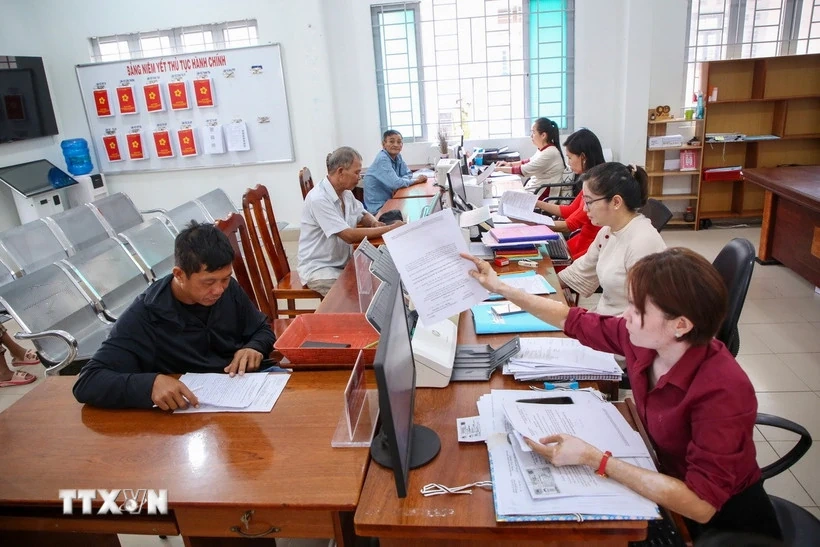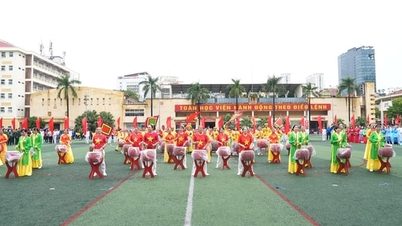
Illustrative photo. (Photo: Giang Phuong/VNA)
Not implementing exams and considering promotion of professional titles of civil servants is a prominent new point in the draft Law on Civil Servants (amended) being submitted by the Government to the 15th National Assembly for consideration and comments at the 10th Session.
According to the explanation of the Ministry of Home Affairs - the agency in charge of drafting the Law project - this is to implement the management and use of civil servants according to job positions. The recruitment, management, arrangement and use of civil servants must be based on the requirements of the job position and the capacity and effectiveness of the civil servant in performing his/her duties.
The draft does not specify job titles in the Law. In public service units, there will be three groups of positions: Leadership and management; professional and technical (job titles); support (accounting, personnel work, etc.). Salaries will be paid according to job position, capacity and results, instead of being linked to "rank." Job titles for civil servants are a tool to standardize job positions in terms of law and qualifications, and are used to rank salaries according to civil servant salary tables.
According to Dr. Le Anh Tuan, Director of the Institute of State Organization and Labor Sciences (Ministry of Home Affairs), the idea of management based on job positions is the basic pillar of the revised Law on Civil Servants. The principle of civil servant management affirms that the recruitment, use, management and evaluation of civil servants must be carried out on the basis of professional title standards, job positions and based on employment contracts.
The application of job positions marks a fundamental shift from a management model based on ranks, levels and seniority to a management model based on specific functions and tasks. This allows public service units, especially autonomous units, to have a basis to accurately determine human resource needs. When recruiting, the head of the unit signs the contract based on practical needs and job positions. The additional human resources must be consistent with the approved task framework, avoiding arbitrary appointments or excess unsuitable personnel, helping to optimize work performance.
“Abandoning salary ranking based on job title promotion and replacing it with management based on job position, changing the core work culture, and placing job position as the strategic key to promoting reform,” Mr. Tuan commented.
Associate Professor, Dr. Le Minh Thong, former Vice Chairman of the National Assembly's Law Committee, said that the draft Law needs to be amended according to the following principles: Integrating "promotion" into "appointment to job position", abolishing the theoretical and formal promotion exam. Instead, it stipulates that when a unit has a vacant high-ranking job position (grade I, II), the unit will organize a public competitive exam to appoint a person to that position.
Any official who meets the requirements and is selected for that job position will automatically be appointed to the corresponding professional title rank and receive the new salary. This method turns promotion from an objective in itself into an inevitable result of competing for competence to take on more difficult jobs.
The bill requires the Government to develop new salary tables for the civil service sector, in which each job position is coded and associated with a specific salary range (minimum-maximum salary).

Any official who meets the requirements and is selected for that job position will automatically be appointed to the corresponding professional title and receive the new salary. (Illustration photo: Quoc Dung/VNA)
However, Mr. Thong also analyzed that compared to the Law on Cadres and Civil Servants, the draft Law on Public Employees (amended) revealed contradictions in career paths and salaries. He cited that the Law on Cadres and Civil Servants is operating according to a system that combines job positions and professions with continued regulations on civil servant ranks and rank advancement to develop careers and increase salaries. This path is clear and hierarchical.
Meanwhile, the draft Law on Civil Servants is aiming to abolish professional title promotions and completely shift to management based on job positions. The possible consequence is inequality, civil servants have a clear promotion path (upgrade) to increase salary, while civil servants may be "stuck" in a job position with a fixed salary range, despite their outstanding capacity and dedication.
In addition, it will create difficulties in the connection. The transfer of a civil servant to a civil servant and vice versa will be very complicated because the two salary and career development systems are not compatible with each other. If the job position is not linked to a promotion system (similar to a grade increase), the civil servant will lack the motivation to strive for positions requiring higher expertise.
Therefore, he recommended the need to build an equivalent reference framework between the civil servant rank system and the job position groups of civil servants to ensure fairness, connectivity and create common motivation for the entire civil service.
Discussing this issue, Mr. Nguyen Tu Long, Deputy Head of the Department of Civil Servants and Public Employees (Ministry of Home Affairs) said that in the past, we managed civil servants "similarly to civil servants," civil servants had ranks and public employees had professional titles. The way of thinking about management by job position is to manage by work, by output products, so we must clarify the differences between the ranks. Specialized ministries must answer the question of what products that job position creates that are different from other ranks. If there is no difference, then eliminate the ranks and extend the salary range.
He gave an example of an accounting position, with a salary of 10-30 million VND, and by the time you retire, you will only receive a maximum of 30 million VND. If you want to move to another salary range, you have to move to another job position.
Or like primary school teachers, whether grade 1 or grade 3, they are still teaching primary school students. “I spent a lot of effort to pass the exam from grade 3 to grade 2 but my job did not change, and because of grade 3 to grade 2, I did not become better,” he said; at the same time, he emphasized that if the output did not change, then that grade should be abolished, the salary range should be extended, up to the highest level, teachers will receive an allowance beyond the frame without having to take an exam.
He also said that the current issue of managing and using civil servants based on job positions only stops at eliminating job titles. When reforming salaries, redistributing ranks and grades according to the nature of job positions, it will comprehensively reform civil servant salaries.
Job positions are not fixed but can change according to development trends, especially the development of science and technology. In the short term, the salary range will be maintained according to the old salary table, but in the long term, it is necessary to re-plan the salary ranges and different types of job positions. The salary will be paid for each position. Only when taking the exam or considering changing to another job position will you receive a different salary range./.
According to VNA
Source: https://baothanhhoa.vn/du-thao-luat-vien-chuc-sua-doi-khong-thi-xet-thang-hang-chuc-danh-nghe-nghiep-267252.htm







![[Photo] Prime Minister Pham Minh Chinh chairs the second meeting of the Steering Committee on private economic development.](https://vphoto.vietnam.vn/thumb/1200x675/vietnam/resource/IMAGE/2025/11/01/1762006716873_dsc-9145-jpg.webp)

































































































Comment (0)